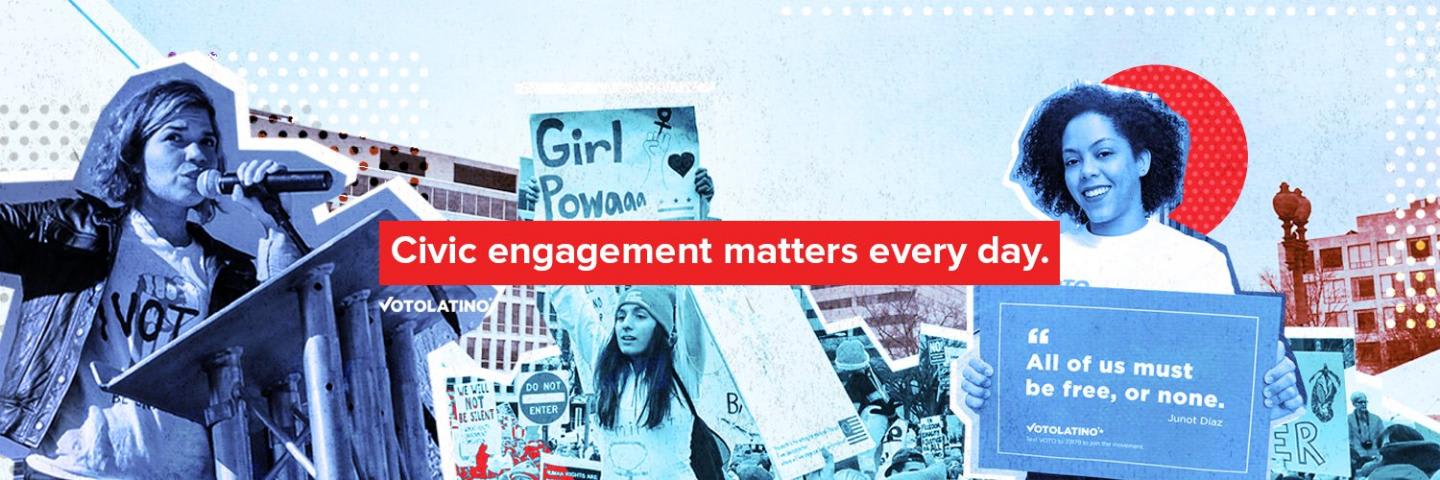Just in case it was unclear, the upcoming 2020 U.S. presidential election is going to be a true turning point in our democracy, and every vote will count. While all elections (from presidential elections to state and local government) are important, this election feels uniquely vital for the future of our nation. And the impact of the Latino vote will undoubtedly be historic, with Latino voters potentially determining the outcome of the election and the future president of the United States of America.
It’s ironic, when you think about it. The current president is making it his mission to discriminate against Latinos, to incite fear of Hispanics (and any ethnic minority for that matter), and to remove immigrants from this country through his hate-fueled actions and attacks against the Latino population. The current administration is working hard to chip away at the rights of immigrants (both undocumented and legal immigrants), through everything from a border wall to ICE raids to Trump’s efforts to include a citizenship question in the 2020 census. And yet, it is that very same ethnic minority being attacked that could remove him from office — that is, assuming they actually turn up to vote.

According to recent research, 2020 will be the first U.S. election in which Hispanics make up the largest racial or ethnic minority in the electorate. Let that sink in for a moment. For the first time ever, Hispanic voters will surpass black voters (a projected 32 million Hispanics compared to 30 million black voters) and will account for just over 13 percent of all eligible voters, according to the Pew Research Center.
Census data shows us that the number of eligible Hispanic voters is on the rise compared to the US population during the 2008 or 2012 presidential elections. And in addition to the increasing number of eligible Hispanic voters, Hispanic voter turnout is also on the rise according to the 2018 Midterm Elections.
So what does all this mean? First and foremost, it means that Latinos will have a lot of power in the upcoming 2020 elections. Hispanic voters have unprecedented influence and the potential to impact the future of this nation in unprecedented ways. But, this power is not guaranteed. In order to maximize the political potential of this ethnic group, Latinos need to show up, literally and figuratively. The question of whether or not 2020 is the year of the Hispanic vote is really not a question of the power of the Hispanic vote, but more a matter of whether or not Latino voters can live up to that potential — and as always, there are several obstacles in the way.
Why the Latino Vote Matters More Than Ever
Between the recent ICE raids targeting undocumented migrants, the President’s promises to build a wall and his verbal attacks on Mexicans and Latino immigrants (beginning on his campaign trail and continuing still today), and the recent devastating shooting in El Paso — a tragedy that is being called one of the deadliest hate crimes ever against Latinos — it’s safe to say that the Latinx population in this country is under attack.
Latinos have been targeted and attacked on US soil throughout history, from deadly attacks and massacres against Mexican Americans in the early 20th century to loss of life as immigrants and refugees attempt to cross the border into the US, to terrorist attacks on Latino families. But the El Paso shooting is the most recent deadly attack that was a clear act of hate. According to Juan Cartagena, president of the civil rights group LatinoJustice, “it was clearly a manifestation of anti-Latino hate, anti-Mexican hate, to be very specific.” And nearly 100 years after another racist attack against Mexicans and Mexican-Americans, it feels like history is repeating itself. And people are terrified, rightfully so. “El Paso is a turning point because it’s citizen and non-citizen alike,” Cartagena said in The Guardian.
But the Latino community is rising up and taking action. Celebrities, public figures, activists and prominent Latinx leaders are all speaking out against this hate crime and all of the injustices being inflicted upon the Hispanic community. In an open letter of solidarity, addressed to the Querida Familia Latina, the authors, including America Ferrera, Eva Longoria Bastón, Diane Guerrero, Alexandra Martinez Kondracke, Olga Segura, and Mónica Ramírez, wrote: “The indignities and cruelty we have endured will never change the truth that the contributions we make to this country are invaluable. Our humanity must be respected. And we won’t stop organizing for ourselves, our children, and for the soul of this nation.”
In a video interview with NBC News, Ferrera added that this letter is a message of love and unity, not a political divide. “It’s a reminder of how much power we have in our community and how much strength there is in spite of how dark these times are.”
Speaking out for what is right, mobilizing our efforts, and coming together as a unified community can do a lot to protect a population and defend their rights. But there is one thing more powerful than positivity and publicly taking a stand — the power to vote.
We must speak up, we must stand up and we must come together. But more importantly, the Hispanic population must vote, because more than ever before, polls and reports show that the Latino vote will be the most crucial in the 2020 election, and every single vote counts.
Hispanic Voter Eligibility and Turnout is On the Rise
Polls and reports from the 2018 Midterm Elections show that Latinos took action and came out in historic numbers. Univision Communications conducted a comprehensive, in-depth analysis of 2018 state-by-state certified voting data, and the findings support that the “rate of increase in Hispanic voters in 2018 compared to 2014, was more than double that of total voters. The turnout rate among the youngest Hispanic voters aged 18-24 exploded by an average of 170 percentage points in California, Texas, Nevada, New York, Illinois, Florida and New Jersey. Among voters aged 25-34 it was 128%.”
In a statement, Univision CEO Vince Sadusky stressed the significance of this data. “The data tells a compelling narrative about the strength and influence of the Latino voter that will inform and shape the upcoming 2020 election,” he explained.
In addition, data published by the National Association of Latino Elected and Appointed Officials (NALEO) shows that more than 40 percent of the Latino citizen voting-age population cast ballots in 2018, which is up from 27 percent in the previous midterm election.
Pew Research Data predicts that for the first time ever in the 2020 election Hispanics will be the largest racial or ethnic minority group in the electorate, with over 32 million eligible voters, accounting for just over 13 percent. This growth in the number of eligible Hispanic voters is substantial — 13 percent is up from 9 percent in the 2008 presidential election and 7 percent in the 2000 election.
If you take one thing away from all of these midterm election numbers and poll research it should be this: the Latino vote is going to be a MAJOR factor in the 2020 elections, and Hispanics are undoubtedly the fastest-growing portion of the electorate heading into the 2020 race for the White House.
Obstacles for Hispanic Voters
While the numbers are certainly in favor of a strong Latino influence in the upcoming election, there are several “ifs” and “buts” to consider. First of all, the Hispanic vote has the potential to make a huge impact, IF voters show up. And the Latino vote could be a significant influencer in the selection of the Democratic candidate and ultimately the person elected as President, BUT they have to actually cast their ballots on Election Day.
We’ve all read the reports and heard the stories that historically Hispanic voter turnout has been underwhelming. While Latino voter turnout seems to be on the rise based on recent elections and midterms, there are still several obstacles in the way, making it difficult for Latinos to cast their votes, and making it uncertain just how influential the Latino vote will be. Research shows that Hispanics will outnumber blacks among eligible voters next year, but that does not guarantee that they will actually cast more ballots and the political implications are still somewhat unclear.
For Latinos, there are several voting barriers to navigate.
A poll conducted by the Public Religion Research Institute (PRRI) and The Atlantic uncovered evidence that voting barriers for Latino voters (and black voters, FYI) were prevalent and commonplace in the 2016 election.
The poll data indicates that voting is routinely more difficult, with more barriers, for people of color than for their white counterparts. For example, 9 percent of Hispanic respondents indicated that in the 2016 election “they (or someone in their household) were told that they lacked the proper identification to vote.” In addition, as The Atlantic reports, 11 percent of Hispanic respondents reported that they were incorrectly told that they weren’t listed on voter rolls, and in regards to virtually every issue identified on the poll, Hispanic respondents were twice as likely, or more, to have experienced those voting barriers compared to white respondents.
In addition, there are barriers for Hispanic voters who were born abroad. The path to citizenship for Latino voters is tedious and often delayed, with wait times for legal permanent residents to naturalize is almost double what it was two years ago, according to reports published in the NY Times. The delays, with the naturalization process taking anywhere from 10 months to 31 months or more, are occurring as the result of increased scrutiny over applications, tightened restrictions and reduction of staff handling the cases (thank you Trump administration). And this is a big problem in terms of the upcoming election, because studies show that Hispanic naturalized citizens are more likely to vote than their U.S. born counterparts. And on top of all of those barriers, many Hispanics feel under attack in America, to the point where their fear for their safety and uncertainty over their place in the US makes them less likely to vote. While those same sentiments could (and should) inspire action and help mobilize the Latino community to vote, it can have the opposite effect.
While the potential power of the Latino vote is significant and could have a lasting impact on the political landscape of this country, there are still several hurdles to overcome before that power can be realized. And the deadline for action is fast approaching.
Going Beyond the Campaign Trail to Elevate the Latino Community
The good news is that voter registration among Hispanics is on the rise, and there are organizations working hard to ensure that the Latino community is educated, empowered, and above all, registered to vote.
Vote Latino is a nonprofit, nonpartisan organization co-founded in 2004 by actress and activist Rosario Dawson with a mission to empower young Latinos and leverage the Latino community through digital campaigns, grassroots efforts and pop culture influence. Increased voter registration is at the core of what Voto Latino is fighting hard and working harder to achieve. According to their website, Voto Latino believes that voter registration and education is crucial. “We know that young Latinos are the gatekeepers of our communities and the future of this country. To continue to shape our national politics most effectively, they must be registered voters. We’re here to make sure of that,” the group said.
To date, Voto Latino has registered more than half a million young voters thanks to efforts such as National Voter Registration Day, in-person voter registration drives, a text-to-register voter registration campaign and VoterPal, an app that makes it easy to register yourself and your peers.
And Voto Latino knows that reaching the Latino community and inspiring Latino voters to change the future involves more than just registering voters. Yes, that’s the first step and increased voter registration is a huge win. But it’s also essential to engage, educate and empower those voters to make their voices heard. The Somos Más campaign works to ensure an accurate count in the 2020 Census so our communities are properly funded and represented.
According to Voto Latino CEO María Teresa Kumar, their mission has always been to elevate the Latino community and mobilize their efforts to create positive change not just for the Hispanic population, but also for everyone. While it began as a focus on Latino voter registration, they are expanding their efforts to serve as a “roadmap for how to become leaders, educators, entrepreneurs, and really anything else you deem possible.” By not just encouraging Latinos to vote, but also making the voting process more accessible to them, Voto Latino is helping to not only build the strength of the Latino community in America and increase civic engagement, but also develop a future generation of successful Latinos.
“It’s the rise of the American Latino voice and how it will shape our country’s future that keeps us excited and invested,” says Kumar.
And it’s working. According to 2018 data from Univision’s analysis, the number of Hispanic registered voters grew nearly four times more (+22%) than non-Hispanics (+6%) in California alone. And in Illinois that number grew three times more (+28%) than non-Hispanics (+9%). In Florida it was 2.2 times greater (+28%) than non-Hispanics (+13%).
The bottom line is that Latino voters will be more influential in the 2020 election than ever before. It is exciting and hopeful and historic in many ways. But in order for the full potential of this powerful community to actually impact the future of this country, it is crucial that we address the barriers that might prevent Latinos from voting and that we work hard to ensure that 2020 really is the year of the Hispanic vote.
For Image credit or remove please email for immediate removal - info@belatina.com







































